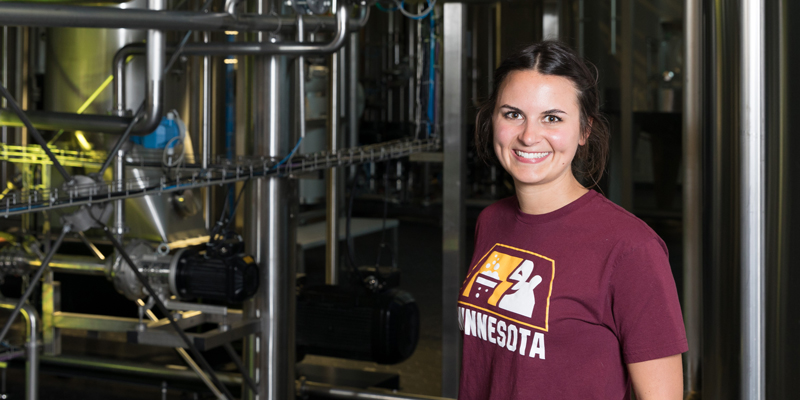CBS alum Riley Seitz put her background in microbiology to work building Surly Brewery's quality lab from the ground up.

Riley Seitz (B.S. Microbiology '14) at Surly Brewery in Minneapolis where she is quality manager.
Job title: Quality Manager at Surly Brewery
What does a typical day at work look like for you?
Each day is a little different in a brewery lab, but there are also several tasks that need to get done every day. The easiest way to describe a brewing lab is to split it into three categories: microbiology, analytical chemistry and sensory. The mornings usually start with counting yeast we are about to harvest from fermenting beers and checking for viability to ensure that the yeast we use for consecutive batches of beer is healthy and in high concentration. Per our sampling schedule, we also have to grab sterile beer samples from tanks of beer that are in different points of their production timeline for microbial spoilage screening. We spend a lot of our time in the lab performing a variety of tests for microbial spoilage screening, from PCR to traditional agar plating. On the analytical side, we need to run all beers that we brew on a instrument called an Alcolyzer. We are regulated by the TTB (Alcohol and Tobacco Tax and Trade Bureau) and need to make sure that all of our beers are within 0.3% of their stated ABV. We also test every finished batch for color (which is measured in a unit called SRM), and bitterness (which is measured in Bitterness Units). Every afternoon our sensory coordinator will set up a taste panel, of which all of our production employees participate. We are trained on how to detect 20+ off flavors in beer by their chemical name, and use this training to screen all finished beers for flavor nuances. When we aren’t running samples, we spend a lot of time creating reports and looking at data trends. It is our responsibility to make sure that our beer is consistent and of the highest quality, and that we don’t veer out our of strict specifications for each of our brands.
How did you figure out this is what you wanted to do?
My father has worked in the beer industry for 20+ years. I knew that brewery quality labs existed, but I didn’t know what the job entailed. During the summer of my junior year, I reached out to Summit brewery to see if they would be willing to host me for a day in their brewery laboratory so I could get a feel for what they did. They were extremely gracious and showed me the ropes of the production space, and laboratory. I could see a lot of connection between my microbiological coursework and the brewery lab. It was also the beginning of the craft beer boom in Minnesota, and I was an avid explorer (and beer drinker) in the taprooms that were popping up all over the Twin Cities. My worlds were colliding! I didn’t work in a brewery lab straight out of college; I found a lab analyst job that paid the bills, but a job that I was definitely not passionate about. While working as a lab analyst I had the opportunity to interview for a job as a beer hall employee at the Surly destination brewery next to campus. That was my opportunity to get my foot in the door at a brewery and to see if it was a true culture fit for me. After several months of working there as a hostess and sever, I asked the right question, to the right person, at the right time, and found they were hiring for a lab technician. I interviewed and was offered the job. Fast forward three years and I can’t see myself working in any other industry!
You use your science background in your job, but what is the most important thing you learned as an undergraduate in relation to what you do now?
Your classmates, professors, and bosses are the best resources you have. Never stop networking and asking a million questions. At the end of the day, the people that you work for, or that teach your classes went through similar struggles as they were trying to (or still trying to) figure out what they want to do for their career. If you find someone interesting or you just want to learn more about how they got to where they are, offer to buy them a pint or a cup of coffee and come prepared with lots of questions.
What do you enjoy most about your job?
The people. Everyone I work with is passionate about what they do. Our jobs are not perfect and can be stressful from time to time, but at the end of the day we get to celebrate our successes over a fresh 16 oz. can of beer or pint that we all helped produce.
Your advice for students or recent grads?
Take time to have fun while you’re still in school. Focusing only on studying during your undergrad can be very mentally and physically exhausting. Try your best to find balance. Don’t panic. You don’t need to land your dream job out of college. Every job in between will teach you more about yourself and what you want to do with your career (and help you pay rent and loans!) Don’t use social networks to stalk your friends, use them to research companies/fields you are interested in and to connect with people who hold jobs you are interested in! 90 percent of the time, people are willing to talk about what they do and offer a helping hand. If a cover letter is "optional," write one.
Are you a CBS with an interesting career story to tell? Get in touch. Contact Stephanie Xenosat sxenos@umn.edu.